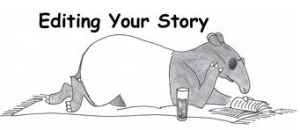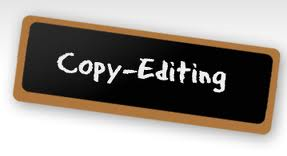What happens after you sell a book to a publishing house? Despite what you may think if you’re a new author, your work is far from finished. In case you haven’t had experience yet with this stage in the writing process or if you are an interested reader, let me describe it for you.
First you’ll hear back from the editor with line edits. Usually we get these as Track Changes in Microsoft Word. The editor will write comments in the margins relevant to the story and will delete/add sentences in the body of the work. You may or may not have a deadline for returning revisions, with your corrections also done in Track Changes.
Assuming your editor accepts this version, next you’ll receive the copy edits. If you’re unsure about the difference between line or story edits and copyediting, see my article here: http://bit.ly/18zyJbj. You make corrections again and send them back. Often I’ll find problems like sentences that should be bumped ahead to the next paragraph, missing punctuation or dialogue attributed to the wrong character. These are formatting errors.
Next come the page proofs or galleys. This is your last chance to make changes and to proofread your work. Again, you’ll have a deadline, often a week or two, in which to respond.
Sometime along the way, you may be lucky enough to receive an advance peek at the front cover design. Recently I got the one for my next mystery, and I immediately sent back two corrections and some color preferences. I’m lucky my publisher is so accommodating.
You may also get a glimpse at the inside cover flap (for a hardcover) and back cover copy. Once I felt the wording was too revealing about the suspects and requested changes. It’s nice when you have a chance to give your approval.
Naturally, if you are self-publishing, you have to hire people to do all these tasks. But you’ll still have the proofreading and corrections regardless of which route you take.
At the moment, I am working on four books. Three are already written. On Book 1, I’m waiting for page proofs and final cover design. This one already has a scheduled publication date. On Book 2, I am hoping for an offer followed by line edits. These will take me a while since the story is a long one. On Book 3, I’m working with an editor toward self-publishing my first original title.
As for book 4, I’m only at the synopsis and research stage, but I need to start writing it soon to finish by my editor’s requested date. Add in various trips and holidays within the next few months, and I’ll be lucky to have time to breathe. This requires prioritizing. The books that come in with edits or page proofs from my publishing houses will be first on the list.
So you see, until a book is actually on the virtual (or real) bookshelves, your work isn’t finished. When the book finally is for sale, then you’ll be jumping on the marketing bandwagon. And that starts a whole new ride.
How many of you have several works in production at the same time?



I have yet to participate in the whole publishing experience, but I’m hopeful it will happen soon. So thanks for preparing me, I’m looking forward to it. Your link was helpful, as well.
Four books at once? Is that to be expected?
Four books is rather a lot for me. I’ll have to put aside the one I’m self-publishing when the page proofs or edits come in for the other two that are in production. And Book 4 is only in the planning stages at this point.
But yes, you’re usually working on book number two while book number one is in production, and you might be making notes for book number three.
The day you get the proofs is as exciting as it gets. The line and copy edits are not that different than the writing part, but with the proofs, you’re holding pages formatted like a book and that’s kind of thrilling. I think that was actually more exciting than the actual pub day.
I’ve got one at the agent’s office, waiting for his notes, and two others that need tweaking or extensive rewriting before they can be submitted. You don’t want to get too deep into one, then have to put it down when the notes come because that has priority, then try to pick up the thread of where you were when you got interrupted. Its a balancing act.
Yes, indeed. Input from agents and editors takes priority. It is difficult to put aside the story you’re working on to read through page proofs of the previous book, but it’s part of the job.
Nancy, It can be a problem, but (like getting older) it’s better than the alternative. I’ve been writing one book, editing another, and trying to market a third. There have been times when I even get the plots and characters mixed up. But that’s part of the process, albeit one that most of us never anticipate when we get into this crazy business. Thanks for sharing.
Now with all the different routes to publishing, it can get even more confusing. We’re always in the middle of one project or another.
My publishers always made me come up with ‘cover copy’ and I hated it. It’s a whole different kind of writing–but at least I could make sure there were no spoilers. If you’re indie publishing, those jobs will all be yours–it’ll be up to you to decide which you can handle and which you need to hire out. I’m working on my next mystery, but my next Blackthorne, Inc. release is with my editor. I find I have to work on one project at a time, so the mystery will be on hold when I work on my edits. Then it’ll take some re-aligning of my head to get back into the mystery.
Terry
Terry’s Place
I dislike doing the cover copy. In the old days, the publisher did that part for you. Now for even my small press houses, I have to write it. It does take realigning, Terry, to switch from one project to another.
Nancy, you’re juggling so much! You’ll have to tell us what your daily workday is like at some point! Maybe a future post?
Good idea, Kathryn. Here’s my workday in a nutshell: Get my writing quota done, whatever I’m working on. Then go online and spend the rest of the day on marketing until dinner. But I’ll work on this topic in more detail for another post.
I have just written three novels simultaneously. What with marketting all my others, all that work is to much. From now it’s one at a time.
Once you build a backlist, there’s even more work involved if you want to promote those, too. Sounds like you will be busy for a while. I keep thinking about the days when I did one book a year. That’s my ultimate goal again someday.
I’m with Kathryn – I want to know how you juggle it all! But sounds like you have it well in hand and thanks for givingTKZ insight into the process.
It’s all a balancing act! I have shut down time in the evenings. That’s when I relax, watch TV, and read.
If the events and connections of last week’s Alaska Writer’s Conference are as serious as all parties involved indicated this post is quite timely for me Nancy. Just had the chief editor of a major publisher take a full mss on the recommendation of an agent who did the same earlier the same day. Two other agents asked me for YA & audiobook samples just a couple hours later. That being said, the jump from independent to dependent seems to be in the near offing, and this hoop-jumping work flow you discuss may become a new and welcome headache in my writerly world. Looking forward to putting the stuff I learned here to real world practice.
Basil, that’s fabulous! Going to that conference certainly paid off for you. Three agents and an editor…that’s quite a haul. You’ll be very busy from here on in! Good luck on these submissions.
I’ve done the full edit cycle with a novella through a small e-press. They really had good people. I squared off with the “historical fact checker” several times, but otherwise, it was quite smooth. The final proofreader caught a howler that had gotten by all of us.
Right now I am trying to convert the WIP that won the award into a finished manuscript. My personal deadline is 12/31/2013. I’m also trying to jumpstart my freelance career that I had let languish.
So, YES, some workday flow articles from all the TKZers would be awesome.
Terri
PS: WTG Basil! And Happy Birthday Joe Hartlaub!
So you have three projects going, your novella, a WIP, and your freelance career. That’s enough to keep you occupied!
Here are my two cents, since I worked in book production, which I consider the location of the proverbial rock and the hard place. Printers have schedules, and there isn’t much flex in them. The production people are sometimes in house and sometimes out of house, but either way, the buck tends to stop with them. If the writer and the editor miss their deadlines, the production people have to make it up, because the printer needs that book on the date it’s scheduled to go to print. They have many other projects which are also slated for specific times.
Since production people tend to come at the end of the line, if you miss your deadlines, they’re the ones who will have to find a way to fix the problem.
One of the editors I worked with had a poster in her office. It read, “Fast, cheap, good. Pick one.” If you miss deadlines and force your production people to try to squeeze their work into a short time, the book will pay for it in the end, most likely, no matter how good they are and no matter how hard they try.
The schedule for a production person:
1) receipt of template by design department. This always involves fixing, since design people are thinking what it looks like and not how efficiently it flows. It usually takes me an hour or two to “fix” their template so it works right.
2) Flow the book. This often takes lots of fixing too, since writers tend to put in pesky elements which have to be removed, such as tabs, double spaces at end of sentences, extra returns, etc. Do them a favor. Don’t use tabs.
3) Production person prints out a hard copy and looks for flowing problems, such as widows, incorrect formatting, etc. (It’s easier to see issues in hard copy. Don’t ask me why.)
4) The whole thing goes back to the proofreaders and editors.
5) The proofreaders and editors return a marked up version to the production person, sometime in hard copy, sometime in pdf form. I like hard copies, since it’s easier to spot their mark ups, but production is moving away from this.
6) Corrections made and back to editors/proofreaders.
7) More markups from editors/proofreaders. Hopefully, you’re almost at the end this time. Make the changes and it goes back. It might come back again, but any changes at this point should be only a handful.
The cleaner your manuscript is upfront, the better you’ll be. Don’t mind when they ask you to polish your work before it goes to production. It’s a money saver in the long-run. (And whatever else you do, DON’T MISS YOUR DEADLINES. It will work against you and your book’s quality every time, even if you aren’t aware of it.)